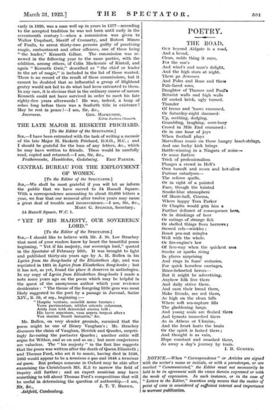" YET IF HIS MAJESTY, OUR SOVEREIGN LORD."
[To the Editor of the SPECTATOR.]
should like to believe with Mr. J. St. Loe Strachey that most of your readers know by heart the beautiful poem
beginning, "Yet if his majesty, our sovereign lord," quoted in the Spectator of February 10th. It was brought to light and published thirty-six years ago by A. H. Bullen in his Lyrics from the Song-books of the Elizabethan Age, and was reprinted in 1891 in Lyrics from Elizabethan Song-books ; but it has not, as yet, found the place it deserves in anthologies. In my copy of Lyrics from Elizabethan Song-books I made a note some years ago on the poem which may be helpful in the quest of the anonymous author which your reviewer desiderates "The theme of the foregoing little gem was most likely suggested to the poet by a passage in Juvenal, Satire XIV., 11. 59, et seq., beginning :— " Ilospite venturo, cessabit nemo tuorum Verre pavimentum, nitidas ostende columnar, Arida cum tali descendat aranea tell: Ric lacve argentum, vasa aspera tergeat alter t Vox domini fremit instantis, &c.
Mr. Bullen, on very slender grounds, surmised that the poem might be one of Henry Vaughan's ; Mr. Strachey discusses the claim of Vaughan, Herrick and Quarles, surpris- ingly favouring the poetaster Quarles ; another critic will argue for Wither, and so on and so on ; but mere conjectures are valueless. The "his majesty" in the first line suggests that the poem was written after the death of Queen Elizabeth ;
and Thomas Ford, who set it to music, having died in 1648, 1603 would appear to be a terminus a quo and 1648 a terminus ad quern. But perhaps someone in Oxford may be able after Exn.mining the Christchurch MS. K.3 to narrow the field of
inquiry still further ; and an expert musician may have something to tell about Thomas Ford's compositions that will be useful in determining the question of authorship.—! am,
Ashfield, Cambtsslang.






































 Previous page
Previous page